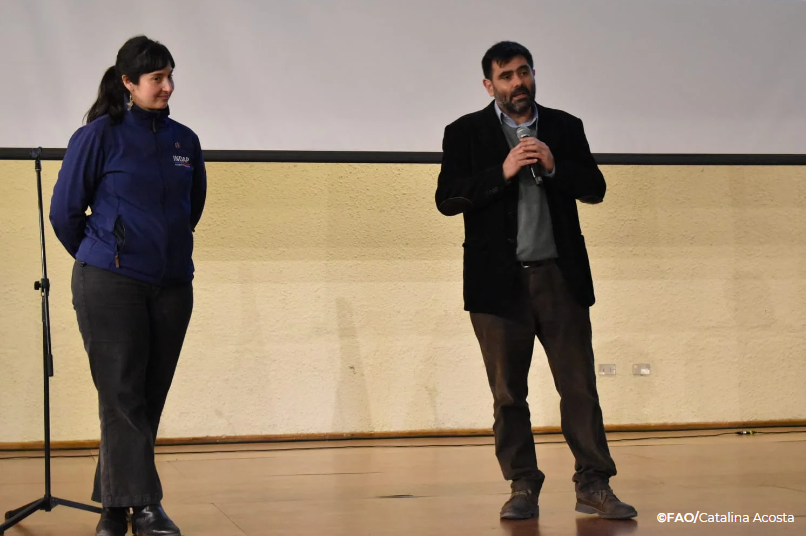FAO and Government of Chile launch digital project in the Ñuble region

©FAO/Catalina Acosta
FAO and the Government of Chile inaugurated a digital pilot that will enhance family farming and rural tourism in the Ñuble region. This initiative is supported by the Ministry of Agriculture, the Undersecretary of Telecommunications (Subtel), the Undersecretary of Tourism and the 1000 Digital Villages project along with the South-South Cooperation program.
The presentation of the project took place during the seminar “Digital connectivity in rural tourism”, an activity attended by rural tourism entrepreneurs and different national authorities, who celebrated the work being done in the area to expand connectivity and use of technological tools.
Santiago Rojas, national director of the Agricultural Development Institute (INDAP), said that the implementation of this digital project “is great news that allows us to reduce the digital divide that we are facing”.
The Director of INDAP also indicated that if before the challenge was for the inhabitants of rural areas to learn to read and write, today the challenge is focused on having access to connectivity and learning to use technological tools to integrate into the digital era.

For her part, the undersecretary of Tourism, Verónica Pardo, emphasized that for the tourism sector it is important to advance in access and use of connectivity, because “if we have wonderful experiences of nature, science, gastronomy, handicrafts, culture and heritage, but we do not have the possibility of showing them, of connecting them (…), it is difficult for us to access them”.
The representative of the FAO office in Chile, Eve Crowley, sent a message in which she congratulated the Government of Chile for its leadership in the task of carrying out this project and referred to the advantages it has for the rural sector.
“We know it is a process that is not free of obstacles and challenges, but it is also an opportunity that we identify as a driving force to foster digital innovation and improve the livelihoods of rural communities”, she acknowledged.
Digitalization project in the Ñuble region
Fernanda Azócar, director of INDAP in Ñuble, and Alberto Ramírez, head of the Rural Development Department of the Office of Agricultural Studies and Policies (ODEPA), were in charge of presenting the details of the project.

During the presentation, they explained that the three main pillars of the project are to provide access to connectivity in premises for community use, offer training to develop digital skills and make equipment available (smartphones, tablets or others).
Also, after the presentation, Fernanda Azócar, affirmed that “the Ñuble region has many attributes that make it wonderful for rural tourism and what better than this digital connectivity pilot to further nurture tourism in the region”.
Conversation “Rural tourism entrepreneurs: best practices”
In addition to the presentation of the digital project, the event had a space in which rural tourism entrepreneurs talked about how connectivity, the use of digital tools and the development of digital skills helped them position their tourism businesses on social networks.
Milza López, FAO monitoring and evaluation specialist, was in charge of moderating one of the blocks of the conversation, which had as guests Daniela Pacheco, entrepreneur of the Mirador de la Luna lodging, and Mauel Alvarado, entrepreneur of the La abuela campsite and president of the Chiloé Rural Tourism Cooperative.
Contact
Ricardo Rivera
Communicator of the Regional Initiative 2
Catalina Acosta
Communication and management assistant for 1000 Digital Village in Latin America and the Caribbean and FAO- China-CELAC project
Ricardo Rivera Communicator of the Regional Initiative 2 [email protected]
Catalina Acosta Torres Asistente en comunicación y gestión para Cooperación Sur-Sur FAO China CELAC. [email protected]
